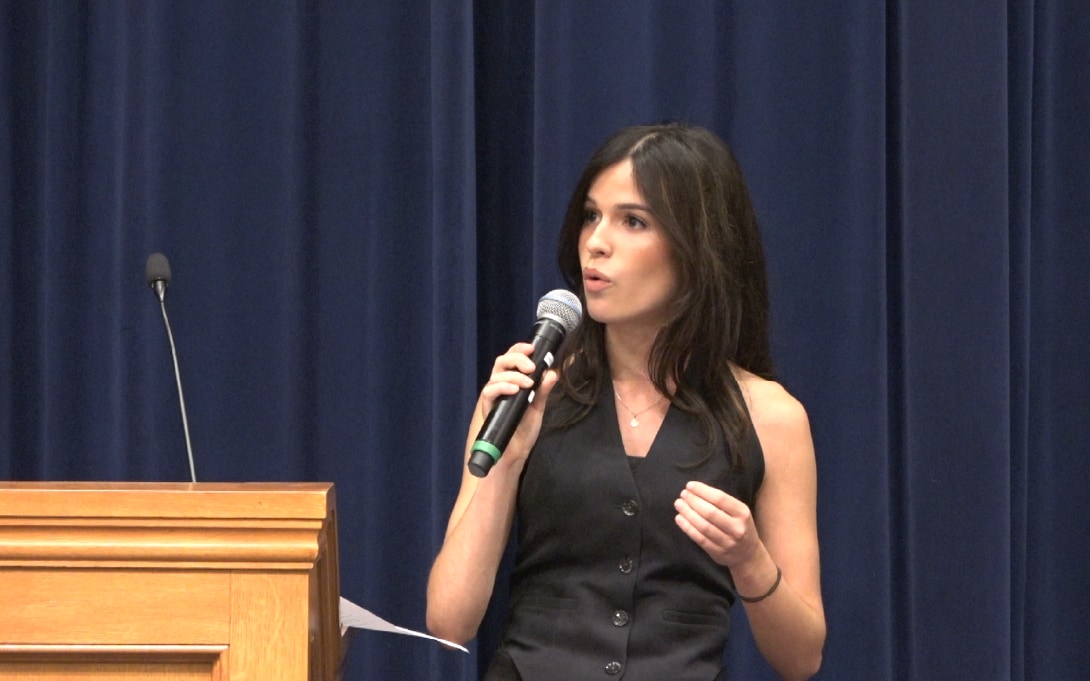
Eleven talented students showcased what they learned during their summer internship at the Ford School 7th Annual Policy Pitch Competition. Undergraduate and graduate students spent three minutes sharing their key deliverables, policy impacts, and lessons learned with the chance to compete for 1st, 2nd, and 3rd student prizes.
The panel of judges awarded students based on the clarity and effectiveness of the presentation, the potential policy impact of their work, and how it influenced the student’s long-term goals. Judges included: Yousef Rabhi, Washtenaw County Commissioner, Rohan Dharan (BA’13), Manager of Secondary Advanced and Enriched Instruction at District of Columbia Public Schools, and Latesha Love-Grayer (MPP’02), Director of International Affairs and Trade at US Government Accountability Office.
Alexie Milukhin (MPP ‘25) – The Institute for College Access and Success (TICAS)
I'm dropping out of college
The first time I ever heard those words. My mother was saying them to me.
I was 10 years old, and we were seated at my kitchen table. She was explaining that my father had been laid off from work. “We are all going to have to make some sacrifices now,” that's what she said. Her 1st sacrifice was her college education. At the time, I remember thinking this is so unfair. Why does it have to be this way?
My name is Alexi Milliken, and the reason I went to policy school was to answer this question. But that's not why I went to Washington, D.C. this summer.
Instead, I went with a different sort of natural, follow-up question to why are things the way that they are? What other ways can things be? How do we target nontraditional college students like my mother?
How do we support low-income college students in accessing basic needs, so they can complete their college education and attain basic needs in the long term through better job benefits and sustained wages?
There are other people asking these same questions, and many of them can be found at the nonprofit. I interned with this summer Tecus, the Institute for college access and success. I was a part of their anti-poverty and basic needs team. And we spent the summer just aggregating this very question: How do we do it?
Well, I was a part of creating a national nonprofit study that surveyed over 300 organizations, where we asked them about how, why and when they engage in political advocacy on these subjects of basic needs and higher education access. We did not stop there.
We traveled between 2 States in 3 days, surveying these organizations, talking to them one on one and asking, “How did these policy innovations translate into programs and services to directly benefit students?”
The answers we came up with blew me away.
In Virginia, there is a coordinated effort across community college campuses to ensure every campus has a center where students can go and access basic needs support personnel to guide them through different programs such as SNAP and childcare programs.
North Carolina is employing incredibly innovative innovative strategies when it comes to meeting their state education attainment goal. They're trying to target nontraditional and parenting college students because they understand to meet their state attainment goal. You cannot just focus on my generation as a part of those efforts. They’re aligning their scholarship programs towards sectors where there will be in-state job demand and will pay family sustaining and not across states. There is a coordinated effort to utilize data more efficiently to support students, for instance, using already existing Fafsa information to notify students as to what programs they qualify for.
Now, in Michigan, we have had similarly innovative and groundbreaking policies these past few years. I would know. Prior to coming to Ford. I was working in the Michigan Legislature, and it felt like every day was a celebration. There is momentum here, but that momentum begets a necessity and a responsibility to continue in that work of continuing. We don't have to look very far to see specific, achievable, and successful examples of how we support students and not just all students, but specifically non-traditional and parenting students, which we must include in these efforts.
If this summer taught me anything, it's that we are not reinventing the wheel. If we are seeking inspiration, we need only to look within our own communities and at our neighbors, at the examples and data they present and use it to guide our imagination, because it is never going to be enough to just lament the way that things are.
We have to do the work to imagine things as they may be and can be.
Thank you.
Read the other pitches:
Georgina Bailey – Lansing Board of Water & Light
Bridget Corwin – Great Lakes Renewable Energy Association
Audrey Dombro – City of Philadelphia, Office of Transportation and Infrastructure Systems
Nia Knox – UM Poverty Solutions
Emily Kuttner – City of Chicago, Mayor's Office
Alexie Milukhin – The Institute for College Access and Success (TICAS)
Samuel Owusu – U.S. House of Representatives, Committee on Education & the Workforce
Aiswarya Padmanabhan – Trust for Social Achievement
Katrina Wheelan – City of Detroit, Office of Budget